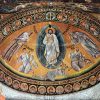Slowly making my way through Augustine’s “City of God” for the first time (to my great shame) has been a treasure trove of theological Aha! moments. The most recent of which came yesterday while reading through book XV where Augustine discusses why God accepted Abel’s offering and rejected Cain’s.
I remember this being a much-disputed topic when I was an Evangelical Christian. We attempted to make sense of God’s acceptance and rejection based on the two types of offerings—meat vs. grain. Clearly, we reasoned, God accepted the meat offering for the symbolism of it: the “firstborn” of Abel’s flock symbolized Christ, and the grain of Cain’s field something inferior. Hence, the story was a lesson on right worship—Christ is our perfect offering and no other offering will do.
Not bad, but now, on this side of the Orthodox Christian faith, I am much more inclined to reach for the Church Fathers to handle these hermeneutical challenges rather than lean on my own understanding.
Case in point, on this story Augustine offers some incredible insights.
Using the Septuagint, Augustine presents the key passage from Genesis 4.6-7 in these words: “And the Lord God said to Cain, Why are you sulking, and why has your countenance fallen? If your sacrifice is rightly offered but is not rightly divided, have you not sinned?… (LXX)
This version is different from most of our English translations. For example, the same verses in the NIV read: “Then the LORD said to Cain, ‘Why are you angry? Why is your face downcast? If you do what is right, will you not be accepted?”
The difference between these two versions is interesting. From the Septuagint we discover that there is something extremely important in the way a person “rightly divides” his offering, a point completely missing in other versions.
Augustine takes this to task laying out some of the different ways a person can make this division:
“It is not rightly divided when we do not rightly select the places or times of sacrifice, or the thing offered in sacrifice, or the one who makes the offering or the one to whom it is made, or those to whom the sacrificed victim is distributed to eat” (The City of God, XV.7).
Cain’s sacrifice was rightly offered, Augustine reasons, since it was offered to the true God; however, it was not rightly divided in that Cain’s deeds were evil. The Apostle John affirms this:
“Do not be like Cain, who was from the evil one and murdered his brother. And why did he murder him? Because his own deeds were evil and his brother’s righteous” (1 Jn 3.12).
Cain’s issue was not the specific offering of grain he chose to give, but rather the fact that his life was evil; his offering was given not out of love for God, but out of love for himself.
From here Augustine presents this remarkable analysis:
“The reason why God did not honor Cain’s gift is that it was wrongly divided in the sense that, although he gave something of his own to God, he gave himself to himself. And this is precisely what is done by all those who follow their own will rather than God’s—that is, who live in perversity of heart rather than righteousness of heart—and yet still offer gifts to God. They suppose that, by means of these gifts, they are buying God’s help not in healing their debased desires but rather in fulfilling them… For the good make use of the world in order to enjoy God, but the evil, in contrast, want to make use of God in order to enjoy the world.”
I would give almost anything today to have had this revelation 30 years ago when my Evangelical group was pining over the meaning of these verses. Almost everything a Christian needs to know about right worship is contained here.
In short, it does not matter how elaborate the sacrifice is, or how “rightly” it is offered. If it is made with the wrong intention, or from a life incongruent with faith, it is worthless. Perhaps worse than worthless—it is dangerous. Did the Apostle Paul not say that participating in the Eucharist without properly “discerning the body of Christ” had led to illness and even the death of some in the churches he visited (1 Corinthians 11: 28-30)? What would he have said about willful manipulation of God (the kind of which Cain was guilty)?
Yes, one can read the actual sacrifice of Christ’s own death into the symbolism of the Cain and Abel story, but there is far more to be understood about our life with Christ and the integrity of our worship. I learn from these passages of Scripture and from Augustine that God will not be mocked in worship. He is not impressed with gifts given for the purpose of manipulating His grace or placating His righteousness. Worship is only worship if it flows from a place of true love, faith, and fear of the Lord.
But even if we should fail to “rightly divide” our worship and offerings, fail to “discern the body of Christ” in the Eucharist for whatever weakness of our own, God encourages us with the same encouragement given to Cain in the second half of Genesis 4.7: “Be quiet, for it (sin) shall return to you, and you shall master it.”
What is meant by this? Again, Augustine offers this response:
“For this is a health-bringing medicine of repentance and a plea for pardon… When God says, ‘For it shall return to you,’ we should understand this to mean not ‘it shall’ in the sense of a prediction but rather ‘it should’ in the sense of a prescription. For a person masters sin only if he does not give it dominion over himself by defending it but instead makes it subject to himself by repenting of it.”
God is indeed abundant in mercy and grace beyond our ability to conceive. Knowing that Cain would resist Him, and slaughter his brother out of envy and hatred, God still encouraged him to repent and master sin. How much more a believer baptized in the grace of our Lord Jesus Christ?

















